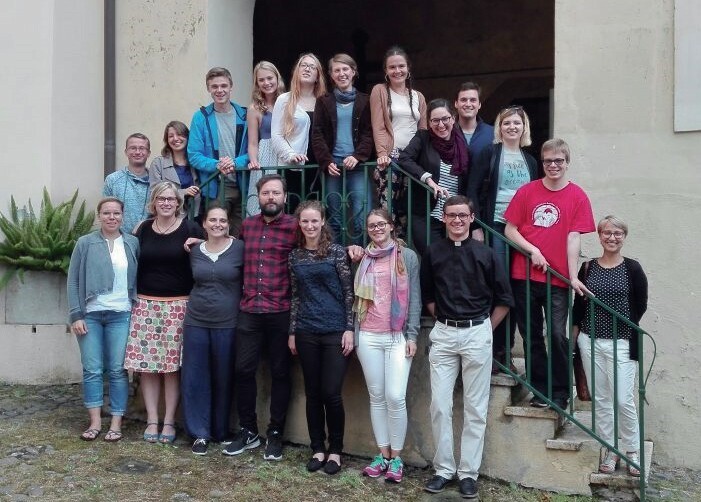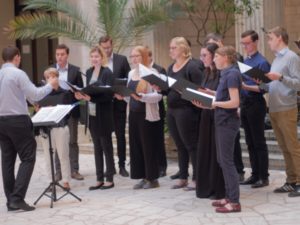“The sum of all these encounters enabled us all to have diverse and valuable conversations, whether on a theological, personal or cultural level.” (Confessio Romana, p.21)

The ecumenical circle enjoyed great popularity this year; if there had already been 24 members at the beginning of the winter semester, this number had risen to 28 at the beginning of the summer semester, roughly equally divided between Catholics and Protestants. Among the Protestants, there were both Calvinists and Lutherans. The members met for a total of eleven so-called “plenary meetings”; six official and five unofficial meetings. At the official meetings, a Protestant and a Catholic moderator were always in action first to introduce the topic. Then there were discussions, in the first two meetings in a large circle, but later we decided to divide into small groups for the discussions.
Among the topics, there were traditional topics such as “Eucharist/Communion”, “Ministry/Hierarchy” and “Tradition”, but also other topics that are less common in ecumenical conversation, such as “Spirituality/Prayer Life”, “Visions for the Future” and “Human Freedom/Divine Grace”. After the discussions there was always plenty of good food or drink. The official meetings took place either in the Germanicum- Hungaricum, in the Waldensian faculty, in the Melanchthon Centre or in San Pastore. The five unofficial meetings all took place in the Germanicum- Hungaricum, usually ending in the beer hall. There was a very good atmosphere in the group and many friendships were made. Probably for the first time in the history of the Ecumenical Circle, an “Ecumenical Choir” was even established: almost two thirds of the Ecumenical Circle members were also active in the choir. The musical direction was in the hands of the Hungarian seminarian Szigmond Attila. The choir reached a high musical level over time and was in action at many masses and services. […]
Sigurd Sverre Stangeland, Ecumenical Delegate (Confessio Romana p.17)

[…] The expectation that after the official meetings one would say goodbye as quickly as possible, at best with bowed head, and go one’s own way, was quickly drowned. Immediately it could be observed that one side, the Protestant, and the other side, the Catholic, were interested in the other faction. In addition to the official meetings, unofficial meetings were soon planned in order to cultivate sociability and the emerging friendships more profoundly. Often the meetings and thus the joint discussions ended too late, sometimes very late, or then again at an early hour. In order to work efficiently and hold constructive discussions, it was always relevant to provide provisions. This was partly done in a triconfessional way: the Catholic side always made hearty efforts to provide wine, beer, schnapps and Fanta. The Lutheran wing baked wonderfully several times, from Reformation rolls to various cakes and pies. Finally, the Swiss showed up one day with Reformed cheese and, also on the initiative of a candidate for the priesthood who always runs through life with a sunny disposition, invited us to a cheese fondue in the beer parlour of the Germanicum et Hungaricum. The ecumenical circle also radiated attractiveness and interest to the outside world. Time and again, Germanicum and Hungaricum members who were not officially members of the Ecumenical Circle sat down at the table with us.
The sum of all these encounters enabled us all to have diverse and valuable conversations, whether on a theological, personal or cultural level. In retrospect, it seems to have been decisive that we got involved with each other and were willing, in great curiosity, to look beyond our own horizons, and thus behind the collar shirts of the candidates for the priesthood, and to ask questions. We found sociable […] and enterprising people who, just like us Melantonini, carry their lightness of being and their joys, fears, hardships and sorrows in their own rucksacks through everyday life. Every game was allowed to be played. After the game was and is always before the game and in this sense, fortunately, the game is never over – be it because we will remember past events with pleasure in the future or because we may meet again somewhere and sometime.
Paula Walker, Academic Year 2017/18 (Confessio Romana p.20)
